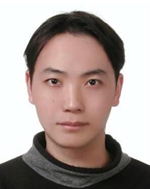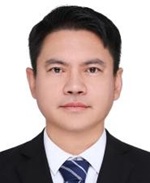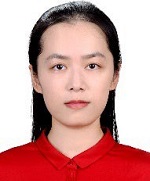Invited Speakers of ICSIP

Prof. Weihua Zhang, National University of Defense Technology, China
Speech Title: Research on Target Detection Technology of Long Horizontal Array in Deep Sea (Abstract)
Zhang Weihua, Ph.D., Professor the College of Meteorology and Oceanography, National University of Defense Technology. He formerly headed the underwater acoustic signal processing group at the Deep-Sea Science and Technology Institute. Dr. Zhang has led dozens of national and ministerial-level research projects and received one First Prize for Scientific and Technological Progress from the China Computer Federation, one First Prize and two Third Prizes for Scientific and Technological Progress from provincial and ministerial authorities.

Dr. Robert Kuo-Chung LIN, AI Research Scientist and Head AI of CCAI, Certis Grop, Singapore
Speech Title: Integrating ontology and knowledge graph to enhance Vision Transformer which to reduce false alarm rates in AI camera clusters of Smart City (Abstract)
Dr. Robert Kuo-Chung LIN, a computer engineering Ph.D., who previously served as a professor at the National University of Technology and Design(Singapore) and as a member of the IEET International Accreditation Committee for Engineering Education in China, Taiwan. currently a leading artificial intelligence scientist. To led the development of 13 successful AI applications to enhance physical for major projects. My life goal is to drive artificial intelligence to create a better life for humanity and to integrate ontology knowledge engineering into business processes to generate revenue and share profits.

Prof. Wen Cheng Lai, Ming Chi University of Technology, Taiwan, China
Speech Title: Image Processing for Silicon Photonics Applications (Abstract)
Wen-Cheng Lai (Senior Member, IEEE), Ph.D., Professor the Department of Electrical Engineering, Ming Chi University of Technology. He has been working in the field of radio-frequency circuits, analog IC integrated design, microwave antenna, computer and communication, artificial intelligence for more than 25 years. He has authored/ coauthored more than 300 SCI indexed journals and IEEE conference/ EI papers. He edited more than 60+ SCI indexed journals. He received the Ph.D. degree from the National Taiwan University of Science and Technology, Taiwan. He is Scopus World Ranking Top 2% Scientists from 2020 to 2023. He is professor at the Ming Chi University of Technology, New Taipei City, Taiwan.

Assoc. Prof. Jiansen Zhao, Shanghai Maritime University, China
Speech Title: A CNN–Transformer-based Beamforming Design for Maritime Downlink Systems with Imperfect CSI (Abstract)
Jiansen Zhao, Engaged in research and development work in maritime satellite communication, intelligent AIS information processing, radar communication antennas, Beidou antennas, and other fields. Hosted and participated in more than 20 national and provincial level projects, including the National Natural Science Foundation General Project, the National Natural Science Foundation Youth Fund, the National Key R&D Program Sub Project, the Shanghai Science and Technology Commission Key Project, the Shanghai Natural Science Foundation, the Shanghai Pujiang Plan, the Shuguang Plan, the China Postdoctoral Fund General Project, and the Ministry of Transport Basic Research Project. Published more than 60 papers, including more than 30 high-level papers with international influence, including 5 Chinese journals. Selected 4 ESI highly cited papers and authorized 4 invention patents.

Assoc. Prof. Chenglong Li, National University of Defense Technology, China
Speech Title: Soft Localization via Unsupervised Multi-Task Joint Learning (Abstract)
Chenglong Li, received the Ph.D. degree in electrical engineering from Ghent University, Ghent, Belgium, in 2022.,From 2018 to 2022, he was a Research Assistant with the Department of Information Technology, Ghent University-imec, Ghent. He is currently an Assitant Professor with the College of Electronic Science and Technology, National University of Defense Technology, Changsha, China, and also with National Key Laboratory for Positioning Navigation and Timing Technology, Changsha, China. His current research interests include positioning and navigation, wireless sensing, wireless channel modeling, and mobile computing.,Dr. Li was a recipient of the International Union of Radio Science (URSI) Young Scientist Award and European Microwave Association (EuMA) Student Grant and Chinese Government Award for Outstanding Self-Financed Students Abroad.

Dr. Zhe Geng, Nanjing University of Aeronautics and Astronautics, China
Zhe Geng received dual B.S. degrees (Magna Cum Laude) in electrical engineering (EE) from Florida International University (FIU), Miami, FL, USA, and Hebei University of Technology, Tianjin, China, in 2012. She received the Ph.D. degree in EE from FIU in 2018 (FIU Presidential Fellowship). From 2018 to 2019, she was a research scientist with Wright State University, Dayton, OH, USA. In Dec. 2019, Dr. Geng jointed the Radar Detection and Imaging Techniques Research Group at Nanjing University of Aeronautics and Astronautics (NUAA) as Research Associate. Dr. Zhe Geng is the primary investigator (PI) of research projects funded by the National Natural Science Foundation of China and the Natural Science Foundation from Jiangsu Province. Her research interests include deep learning, image processing, and automatic target recognition. She published more than 50 papers in journals and international conference proceedings and is the 2nd author of Radar Networks (CRC press, 2020).

Prof. Bingnan Wang, Aerospace Information Research Institute, Chinese Academy of Sciences, China
Speech Title: Latest Advances in Synthetic Aperture Ladar (Abstract)
Bingnan Wang received his Ph.D. degree from the Graduate University of Chinese Academy of Sciences, Beijing, China, in 2011.Then he joined Aerospace Information Research Institute, Chinese Academy of Sciences (AIRCAS), Beijing. He has been a research fellow with the National Key Laboratory of Microwave Imaging (MIL), AIRCAS. He is currently deputy director of MITL and also the team leader of multi-dimensional SAR imaging and detection. He has authored and co-authored more than 100 peer-reviewed journal articles in the field of SAR imaging technology. His research interests are focused on signal processing of advanced SAR system, including theory and applications of SAR interferometry, harmonic radar, synthetic aperture ladar imaging, and air/ground moving target detection.

